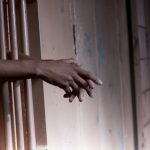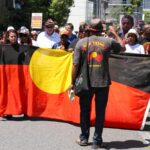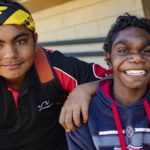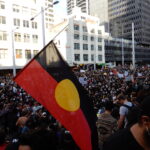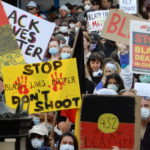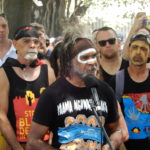The Authorities Fear the Movement to Stop Atrocities on First Nations People
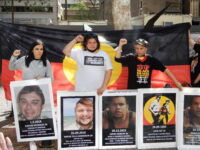
NSW police permitted the Indigenous Social Justice Association (ISJA) to hold a silent march through the Sydney CBD last Saturday to mark the anniversaries of the deaths in custody of John Pat and Wayne Fella Morrison.
The granting of permission was significant as there’s an unofficial ban on protests of over 20 people at present. And ISJA was allowed to proceed with two groups of under 20 participants walking in socially distanced single file, as long as the two sections had a wide space between them.
ISJA secretary Raul Bassi said he was able to persuade NSW police to double up on the regular restrictions as he’d suggested taking the matter to the Supreme Court again. It was Bassi’s name that appeared on the court listing of the first attempt to shut down a Black Lives Matter rally in June.
Prior to the march commencement, a white ally questioned when the Australian public might wake up to ongoing First Nations deaths in custody. And he wondered why it took the killing of African American man George Floyd at the hands of white police in the US to make this country react.
The most obvious comparison to Floyd’s death – and the central focus of many local Black Lives Matter rallies of late – is the 2015 killing of David Dungay Junior at the hands of five prison officers at Long Bay Gaol.
Yet, unlike in the States, none of those involved have ever been charged.
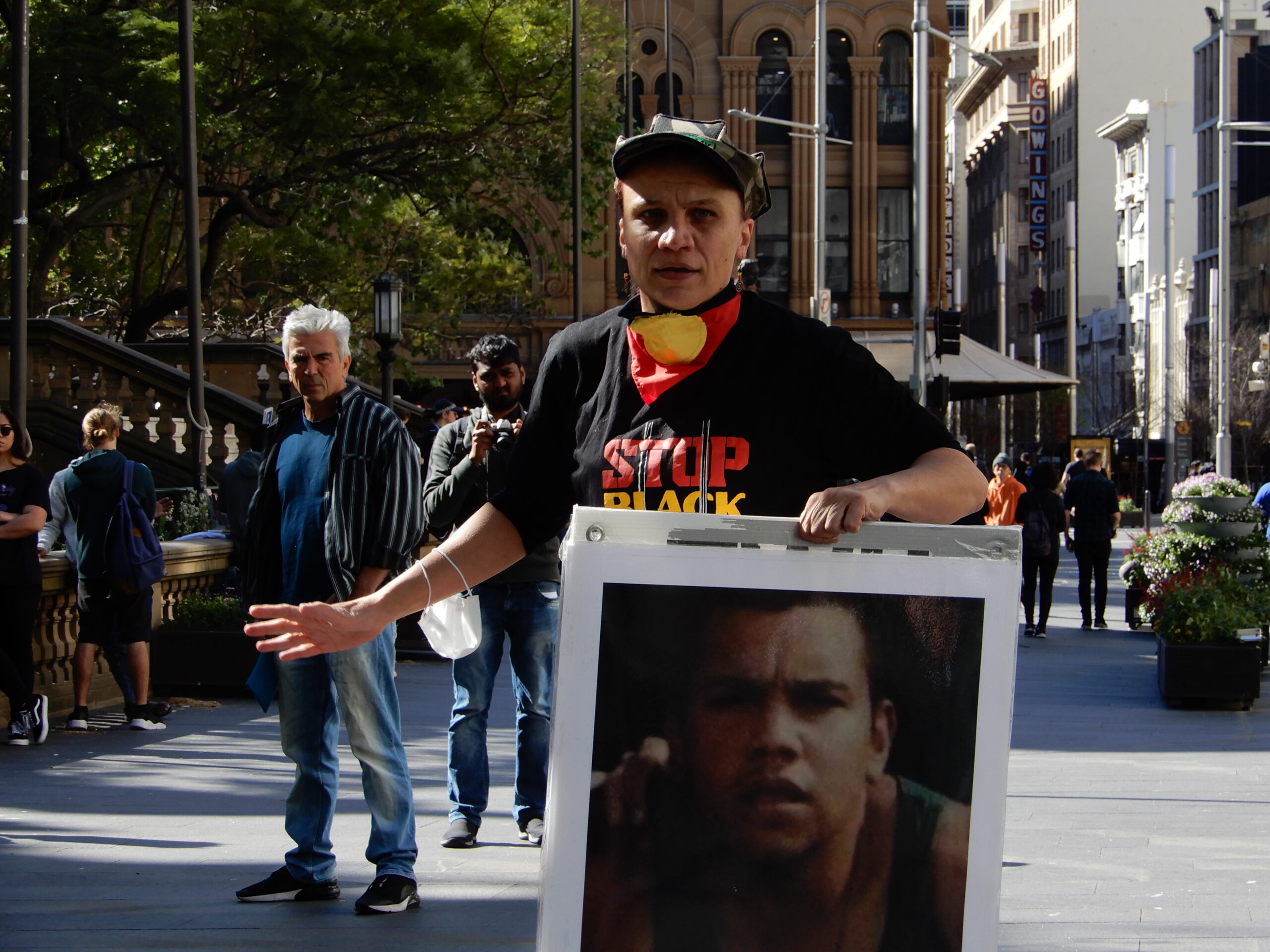
They can’t breathe
“Enough is enough, Australia, of the police system murdering our people and getting away with it,” Elizabeth Jarrett told the procession in front of Sydney Town Hall.
The Gumbaynggirr Dunghutti Bundjalung woman was holding a sign that featured a photo of her cousin David Dungay Junior at the time.
Dungay was held face down in the potentially lethal prone position on a bed in a cell of Long Bay hospital ward, as he repeatedly called out that he couldn’t breathe. The subsequent inquest into his death resulted in no recommendations of any charges being laid against the guards responsible.
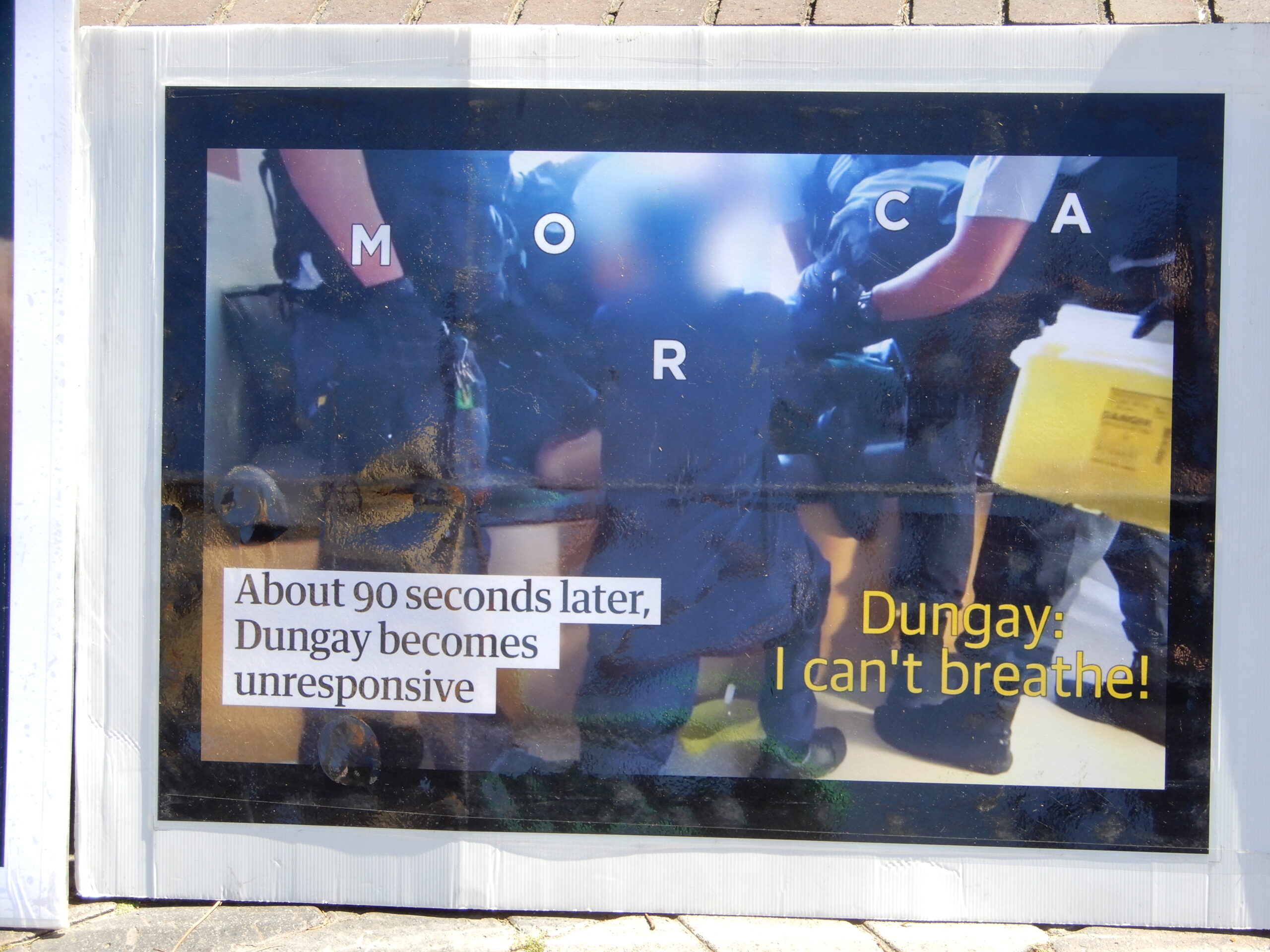
The Dungay family held a press conference on 31 July this year, where they announced that prominent criminal barrister Phillip Boulten SC had issued advice outlining that there is potential for charges to be laid against some of the guards involved, but no action has been taken in response.
Just days prior to the announcement, the NSW Police Force began enforcing this state’s unofficial ban on public protests of over 20 people, as it moved to shut down a demonstration calling for justice for David Dungay, which was to be held at the Domain-Djarrbarrgalli.
Indeed, so strong is the desire of NSW authorities to keep the issues around the young man’s death in custody silenced that the state police took the organisers of the protests that were focused on Dungay’s death to the Supreme Court twice to have their actions prohibited.
Justice for Fella
Last Saturday, 26 September 2020, marked four years since the death in custody of Wayne Fella Morrison. The 29-year-old Wiradjuri, Kookatha, Wirangu man died in the back of a van at SA’s Yatala Labour Prison, after being wrestled into the vehicle and held down in the prone position.
Jarrett sent out her respects to Wayne’s mother Caroline Andersen, who couldn’t make it to the silent procession.
“Four years on, this man hasn’t even gone through a coronial inquest,” Jarrett told those gathered. “It’s taking place in April and May next year.”
The fervent activist then went on to lament the coronial process, which, she asserts, too often ends in “support for state police” and “corruption”, which in turn leaves the families “broken hearted”, and she then reflected on the impacted family members present at the march.
The pandemic has delayed Fella’s inquest. But that was a further delay, as a series of travesties have led to the inquiry being drawn out. This included the seven guards in the van attempting to be excused from testifying, while 19 guards tried to have the deputy coroner thrown off the case.
The requirement that a coronial inquest take place following a custody death was a recommendation of the Royal Commission into Aboriginal Deaths in Custody.
However, ISJA has been asserting of late, that the coronial process has simply become a means to officially excuse such deaths as accidents.
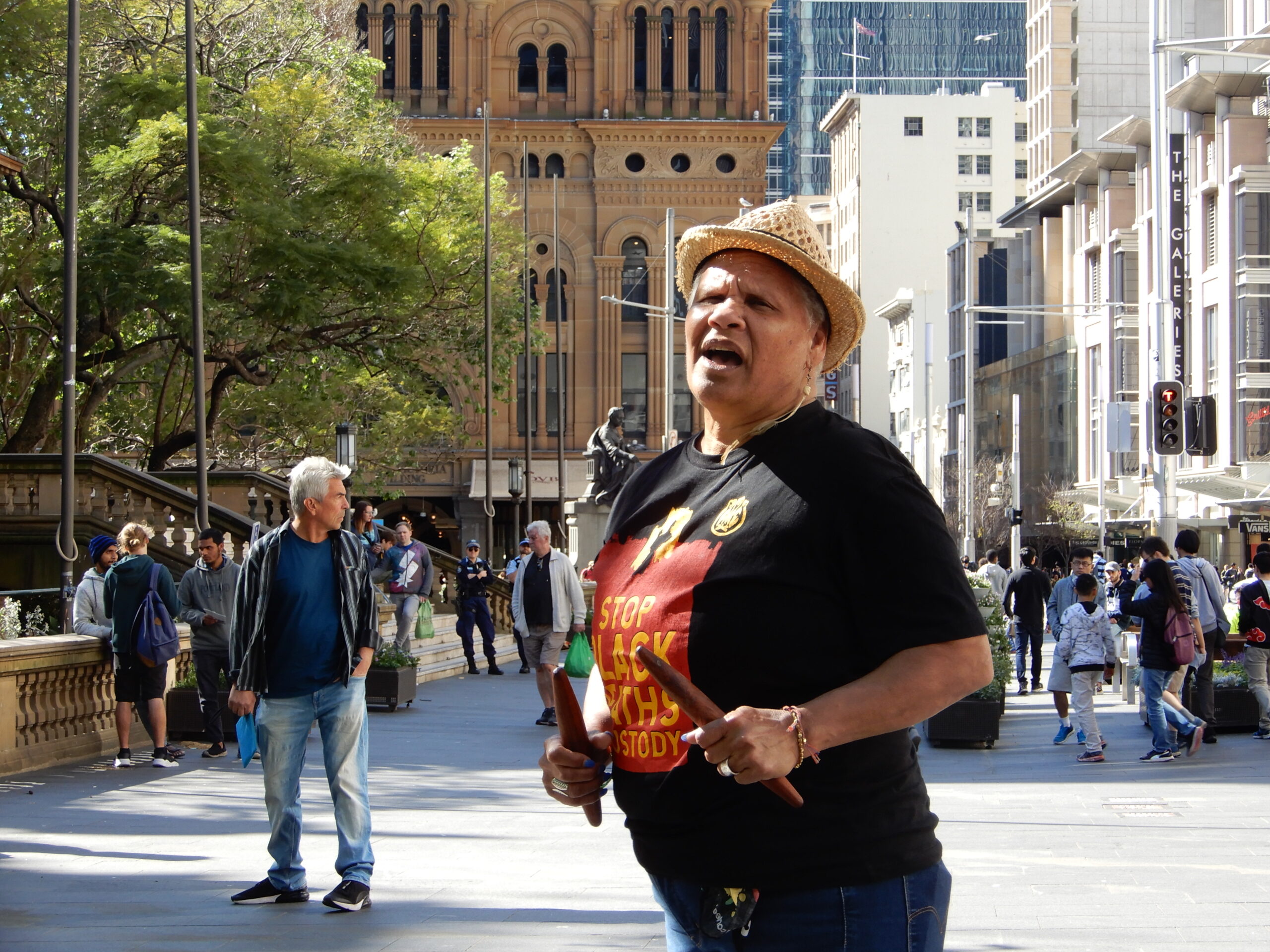
Black Lives Matter
“In all of our coronial inquests, no one has ever come to justice, so they’re obviously hiding things,” ISJA spokesperson Faith Black said, after she’d led Saturday’s deaths in custody silent march through the Sydney CBD.
“It just goes to show that if you’re doing something wrong, you’re going to try to barricade it.” she told Sydney Criminal Lawyers. “You’re going to try and hide behind some screen.”
Since the Royal Commission delivered its recommendations in 1991, at least 440 Aboriginal and Torres Strait Islander deaths in custody have occurred. And not one police officer or prison guard has ever been convicted of a related charge.
Black made clear that the brutal way police are killing black people in the US is no different from the situation of black deaths in custody in Australia.
The Butchulla and Meriam woman added that over here it’s perhaps more hidden, and that’s the way the authorities like to keep it.
“If we keep protesting, they’ll be more exposed,” Black explained. “What’s happening in America, which has come over here with the Black Lives Matter movement, is going to tip them over. And they’re afraid of that.”
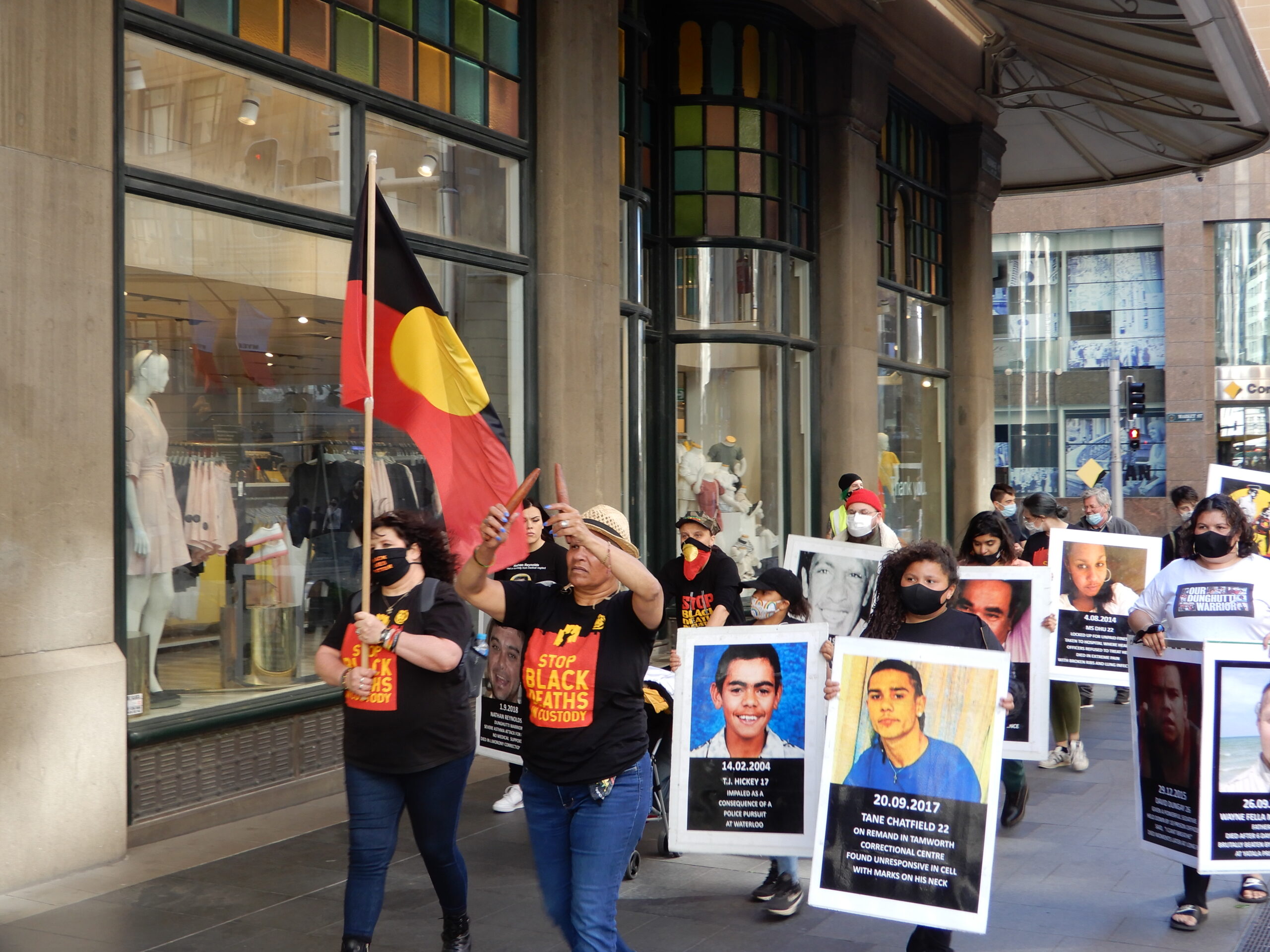
A tale of two justice systems
A big news item this week is company Ardent Leisure was fined $3.6 million over the deaths of four people at its Dreamworld theme park in 2016. The company pleaded guilty to three breaches of workplace health and safety laws that led to the deaths of four non-Indigenous people.
However, no one has even been charged in relation to the workplace deaths of David Dungay Junior or Wayne Fella Morrison, as yet.
And it is doubtful justice will ever be brought over the killing of John Pat on 28 September 1983.
The 16-year-old Yindjibarndi boy was repeatedly struck and kicked by WA police officers in the town of Roebourne, as he’d attempted to intervene as officers bashed another young First Nations man.
Four officers were actually charged with manslaughter over the death of Pat. Although, an all-white jury subsequently acquitted them.
Pat’s death was a key driver in bringing about the Royal Commission into Aboriginal Deaths in Custody. It delivered 339 recommendations, most of which are still waiting implementation.


